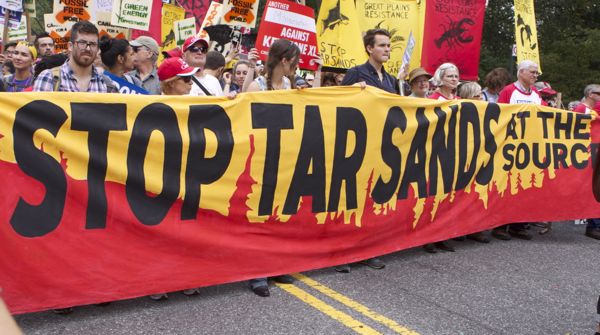Christie DEP Promotes Huge Expansion of Tar Sand Oil Imports
DEP issues “minor modification” of oil terminal air permit without public review
DEP denies jurisdiction to review climate impacts
It’s The Climate, Stupid!
Scott Fallon at the Bergen Record has a very important story today on an outrageous move by the Christie NJ DEP to issue an air pollution permit that would allow the Buckeye oil terminal in Perth Amboy NJ to double its oil processing capacity, read the whole thing:
Unfortunately, Fallon, in a series of stories, has narrowly and poorly framed this issue as limited to rail transport safety.
As a result, he again shoehorns this broader story into that frame and thereby misses the far more important climate issue and DEP regulatory policy issues.
The narrow framing as a rail safety issue also allows DEP to deny jurisdiction.
This is stunning, because the DEP permit in question is an air pollution control permit.
Obviously, air pollution does not end “at the fence line” nor does NJ DEP’s jurisdiction.
Second, as Fallon notes, the DEP chose to define the Buckeye oil terminal air permit as a “minor modification” under NJ DEP rules.
But Fallon fails to note that DEP could have classified the permit as a modification that triggers public notice, comment and hearing procedures.
Additionally, US EPA, which has independent authority under the Clean Air Act and oversees the NJ DEP air pollution permit program could pressure NJ DEP to conduct public hearings on the proposed permit expansion or even decide to conduct their own public hearings.
So, by not objecting to the DEP’s “minor modification” classification of this permit, or invoking EPA’s own authority to review the permit, the US EPA is complicit in the decision.
In contrast to the Christie NJ DEP’s negligence, Fallon notes that environmental regulators in New York DEC have used the environmental permit process to review a similar operation in NY, while the Christie NJ DEP is in full denial mode. Fallon reports:
A spokesman for the DEP said the agency’s focus is on regulating only the plant and not the environmental risks associated with transporting hazardous materials like oil through the state. DEP officials say they lack the power to regulate beyond Buckeye’s property.
“Our authority begins and ends at the fence line,” said Larry Hajna, an agency spokesman. “We regulate emissions and have requirements for how materials are handled, stored or discharged, but we cannot limit how much is processed or how much is transported.”
One would think that Fallon would be curious about what legal authority NY DEC has that the Christie DEP says they don’t have.
First of all, under current NJ DEP air pollution control regulations, greenhouse gases are defined as “air contaminants”, i.e. regulated air pollutants. See Gov. Christie’s own website:
Carbon Dioxide Classified as a Pollutant
In November 2005, the DEP adopted a new regulation under the authority of New Jersey’s Air Pollution Control Act to classify CO2 as an air contaminant. This rule enables NJ to implement its responsibilities under RGGI and to enact additional rules to control CO2 from other sectors as necessary.
The DEP could invoke that regulatory authority to review the lifecycle and cumulative climate change impacts of the huge expansion of oil terminal capacity.
This DEP air permit decision has nothing to do with a lack of jurisdiction for off site rail transportation risks.
Second, I do not know what regulatory authority NY DEC has invoked.
I do know that NY has a broader “mini-NEPA” law than NJ, known as “SEQRA”, that requires environmental impacts statements as part of the permit process.
NY DEC could have relied on SEQRA.
But, regardless of that, for air pollution control permitting, I am certain that NY DEC has at least the same basic permit program regulatory authority under their State Clean Air Act permit program as NJ does.
However, in addition to that authority, on September 22, 2014, New York Governor Andrew Cuomo signed into law the “Community Risk and Resiliency Act”, which amends several provisions of the Environmental Conservation Law (ECL) to incorporate consideration of potential climate change impacts, including physical risks due to sea level rise, storm surges and/or flooding, when evaluating projects under a number of existing permit programs.
The NJ Legislature has not even considered a similar law to put teeth in NJ’s Global Warming Response Act.
And for some reason, NJ’s vast array of environmental groups are not even trying to get that kind of law passed in NJ.
Now why is that?
They found over $700,000 to fund a PR campaign to steal money from DEP environmental programs.
Why No money or campaign for climate?
Good questions for followup coverage by the Record and advocacy efforts for NJ environmentalists to consider.
